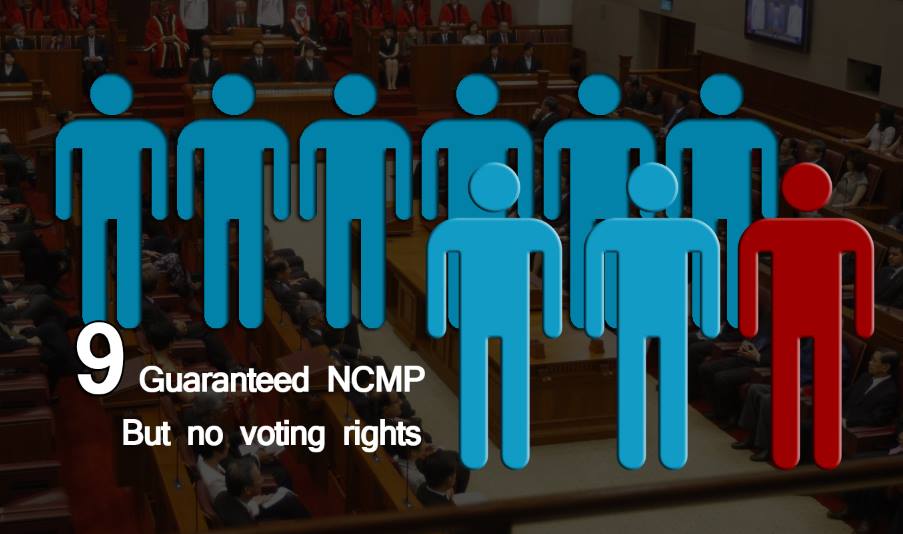By: Richard Wan
In yesterday’s (29 Jan) Parliamentary debate, Minister in the Prime Minister’s Office Chan Chun Sing accused WP of political manoeuvring when WP proposed to transfer the vacant NCMP seat from Ms Lee Li Lian to Dr Daniel Goh.
Dr Goh, an NUS sociologist, was a WP candidate contesting in East Coast GRC.
Mr Chan told Parliament, “We want to see the third NCMP seat filled. What troubles us is the (WP’s) manoeuvring behind it.”
He questioned the WP’s motivations in supporting the decision of Ms Lee, its losing candidate for Punggol East, to reject the NCMP seat.
He also criticised Ms Lee’s comments made last year when she said her seat should go to a colleague as “there are better people in the party that we should showcase”.
“Let us not turn the NCMP scheme from one of service to the nation into a revolving door for partisan political talent displays,” he said.
Genesis of NCMP Scheme
Actually, it can also be said that the NCMP Scheme approved by the PAP-dominated Parliament in 1984 is, in fact, a political manoeuvring itself by the PAP.
An NCMP is a member of an opposition political party who is declared to have been an MP despite having lost in a general election by virtue of having been one of the best performing losers. NCMPs are, however, not allowed to vote on several types of bills such as bills to amend the Constitution and motions of no confidence in the Government.
The NCMP scheme was a significant modification of the traditional Westminster system of government. The genesis of the scheme can be traced back to 1981 when, for the first time since the independence of Singapore that an opposition member, Mr J B Jeyaretnam, was elected as an MP through a by-election in Anson. PAP was clearly surprised by the event as it did not expect to lose Anson. Mr Goh Chok Tong even blamed the people of Anson for PAP’s loss [Link]:
—
Mr Goh took the loss of the by-election as an indication that the people of Anson have a lower threshold of pain. “And if that is reflective of the people of Singapore, I worry for Singapore. But I don’t think so,” he added. He agreed that the inevitable continued rise in the cost of living will affect the people of Singapore, especially those in the lower income group but said: “On fundamental policies, we will push on. We will not be distracted by the loss of one seat.”… He said, “We did not expect to lose. We have lost by a very close margin but it is not the end of the world for the PAP.” “We have fought on principles and if the people of Anson have shown that they have a lower threshold of pain, so be it.”
Then PM Lee Kuan Yew was also surprised by the loss. Mr Lee said [Link], “I had expected a shift of about 15 per cent. I never expected 35 per cent. We’ll have to find out why it happened and take the necessary measures.”
Then 2nd DPM S Rajaratnam thought that PAP lost because the younger voters of Anson wanted to see an opposition in Parliament.
Ploy to stop the emergence of strong opposition in Parliament
During the Parliamentary Second Reading of the NCMP bill in Jul 1984, just before it was introduced in the 1984 GE in Dec, then PM Lee Kuan Yew explained the need for the NCMP scheme.
First, he said that having a minimum number of opposition members in Parliament through the NCMP scheme would provide younger PAP MPs with sparring partners to “sharpen their debating skills”.
Secondly, the presence of opposition members in Parliament would educate the younger generation of voters about the role of a constitutional opposition and the limits of what it can do. He said this was especially important because the younger generation who had not lived and witnessed the conflicts within Parliament in the 1950s and 1960s “harbour[ed] myths about the role of an Opposition” and “had no idea how destructive an Opposition could be”.
Thirdly, the presence of non-PAP MPs in Parliament would act as a check and balance against any governmental impropriety. According to him, “some non-PAP MPs will ensure that every suspicion, every rumour of misconduct, will be reported to the non-PAP MPs”. The readiness of non-PAP members to bring forth any allegation of misfeasance, or corruption, or nepotism would “dispel suspicions of cover-ups of alleged wrongdoings”, he said.
But opposition MP J B Jeyaretnam didn’t think so. Mr Jeyaretnam noted that PAP introduced the idea of having NCMPs after he had won the Anson by-election. That victory saw the election of the first opposition MP in Parliament since 1965. Mr Jeyaretnam said that the PAP saw the possibility of the emergence of a strong elected opposition in Parliament.
So, PAP tried to stop the trend by providing for the appointment of NCMPs. The real object behind this move, he added, was to persuade the electorate to elect all PAP candidates into Parliament without the necessity to vote for opposition candidates.
“So it is the antithesis of what Parliament is,” Mr Jeyaretnam said [Link].
NUS law professor and constitutional law expert, Prof Thio Li-ann also noted in her book, “The Post-colonial Constitutional Evolution of the Singapore Legislature”, that the NCMP scheme can inhibit the natural growth of an elected opposition voice in Parliament as the electorate’s motivation to vote in an opposition Member into Parliament is conceivably diluted by the assurance that a default mechanism exists for the “best losers”.
So, the question we have to ask ourselves is why the NCMP scheme was conceived only after the emergence of the first elected opposition MP in Parliament in 1981 and not at the beginning when Singapore was formed in 1965?
A political manoeuvring? What do you think?

